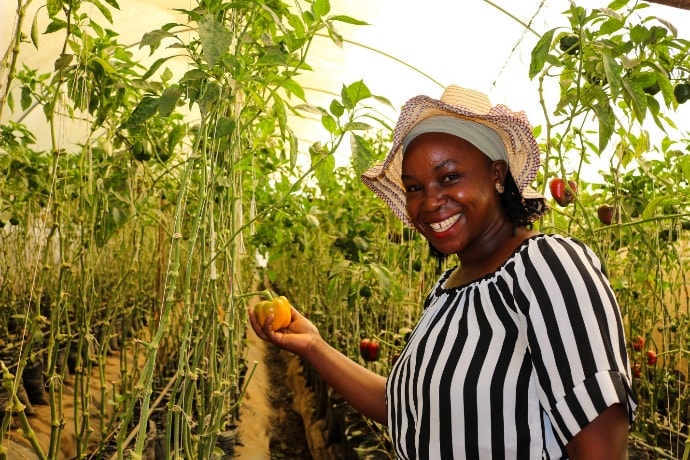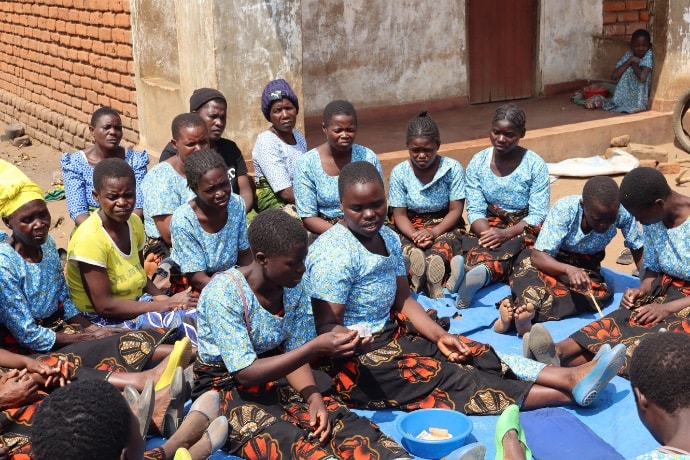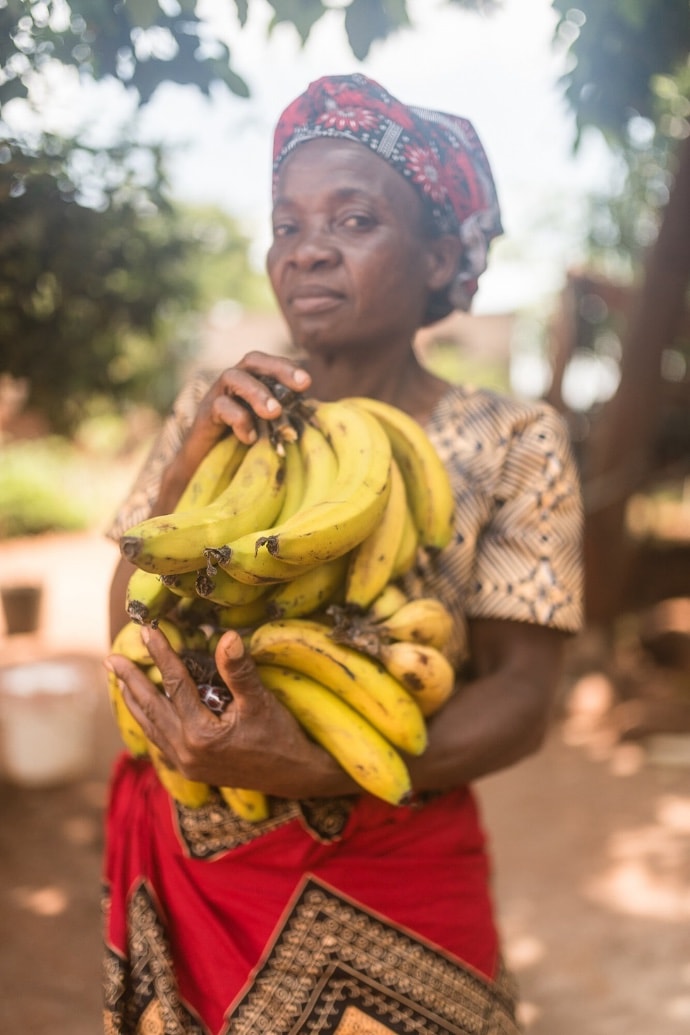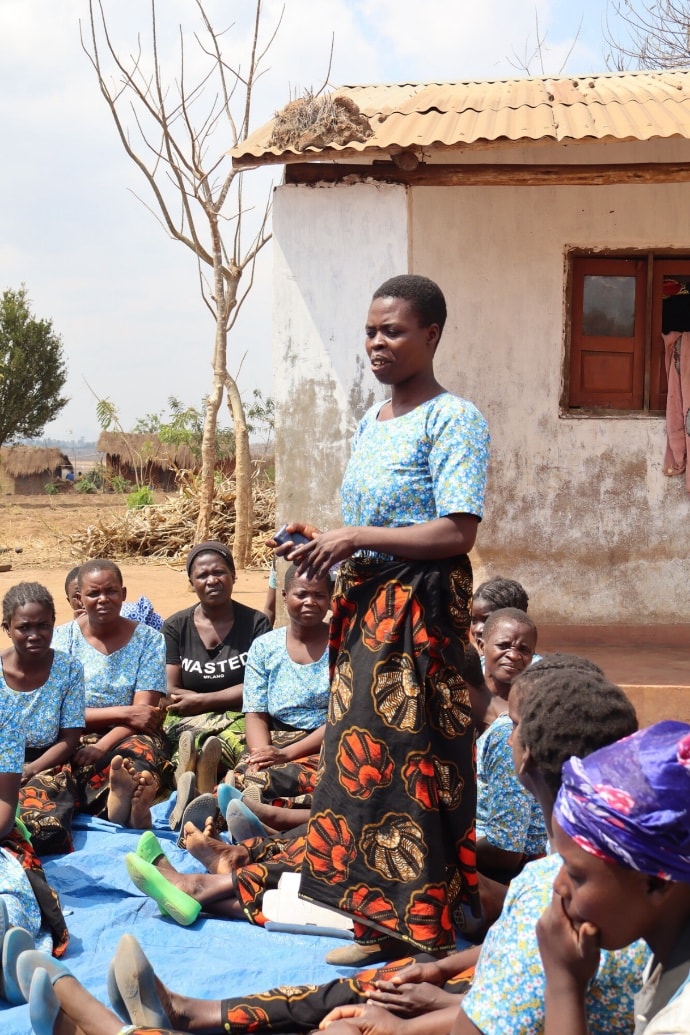By Joe Dutra, Opportunity International

Woman smallholder farmer admiring her pepper crop. Photo: Opportunity International
Smallholder farmers are responsible for producing one-third of the world’s food supply and nearly 80% of the food in low- and middle-income countries. They are also among the most vulnerable populations, as agriculture remains the primary livelihood for millions living in extreme poverty. Opportunity International believes that through targeted financial solutions, training, and support, smallholder farmers can increase their productivity, income, and resilience, ultimately building thriving rural communities. Our goal is clear: help farmers grow more and earn more.
Since 2008, our Agriculture Finance program has been dedicated to providing data-driven, human-centered interventions for this crucial population. To date, we have released over $450 million in capital to sustain the agricultural value chain and empower smallholder farmers—but supporting this critical pillar of the global economy requires a multi-pronged approach.
In an era of political, economic, and environmental instability, the people growing our food worldwide are facing ever-increasing risk. And just like the farmers we support who have had to adapt and evolve their own practices in a changing world, Opportunity has expanded our own interventions to meet the needs of smallholders.
In recent years, Opportunity International’s strategy has evolved into a partner-rich model that expands our portfolio of interventions beyond financial inclusion, collaborating with some of the world’s leading impact financial institutions to design sustainable solutions, offering comprehensive support to smallholder farmers.
From pioneering inclusive finance and small-scale agriculture techniques to adopting artificial intelligence, Opportunity’s commitment to innovation is dedicated to one of the most vital links in the global food supply: smallholder farmers.
Empowering Farmers Through Innovation and Support
Farmers need holistic assistance to succeed, and our array of trainings and services helps smallholders develop new practices to adapt to climate change while simultaneously increasing their appeal to a risk-averse financial sector. The foundation of strategy involves our robust network of Farmer Support Agents (FSAs), who deliver critical training and resources directly to farmers in their communities. These local farmers, equipped with smartphones and digital tools, help their peers improve financial literacy, business management, and farming techniques.
With 1,724 FSAs currently active, we’ve connected over 280,000 smallholder farmers to the knowledge and tools they need to thrive. In many countries, ministries of agriculture set up networks of “extension workers” to engage with rural smallholders but often face challenges in reaching communities where they have no real connections. Our FSA network is designed to uplift and support local leaders, giving them the tools to travel to neighboring villages and provide quality information on farming practices, support services, and financial resources.
These efforts reduce risk for financial institutions and attract capital by equipping smallholder farmers with the skills to adapt to changing climates and farming conditions – and with new digital interventions, the network’s ability to meet the needs of rural smallholder farmers is on the cusp of rapid growth.

Women smallholder farmers gather, learn, and share. Photo: Opportunity International
Digital Innovations for Farmer Support
Some of the greatest challenges supporting smallholder farmers in low- and middle-income nations are due to accessibility in rural areas. In countries like Malawi, for example, over 80% of Malawi’s population resides in rural or isolated areas.
For many farmers, the only means of obtaining agricultural support is via accessing Ministry’s of Agriculture, who provide locally-specific advice and insights into agronomy and animal husbandry. But reaching this government support can be difficult – with most offices often miles away, and visits from extension support sporadic at best. For a population that rarely has access to transportation, trying to get vital agricultural information from these networks come at serious opportunity risk.
Working with our Farmer Support Agents, Opportunity piloted a new digital tool: UlangiziAI, an AI-powered chatbot designed to help rural farmers access critical agricultural information in real time. The chatbot, available in both English and Chichewa, provides farmers with advice via a WhatsApp chatbot – informing famers on everything from crop management to livestock care.
Take Anna, a farmer whose land was seriously impacted by 2023’s Cyclone Freddy and the following floods, causing in a Soya Rust outbreak that decimated her crops. When using the app, Anna asked what type of herbicide she needed to combat soya rust. In moments, the app shared that she needed a fungicide, not a herbicide, and shared a dozen types of products that would work effectively. This tool is transforming how farmers like Anna access information, saving time and resources in regions where formal agricultural support is limited.
In its first three months, UlangiziAI received more than 4,000 inquiries. Combined with our FSA network, this digital innovation strengthens farmers’ resilience, helping communities and local economies recover from climate shocks and rebuild stronger.
Overcoming Financial Barriers for Regenerative, Gender-Inclusive Impacts
Our experience has shown that women are the backbone of rural economies, yet they face significant barriers, such as unpaid care responsibilities and limited access to financial resources. 61% of our agriculture finance clients are women – and so to address these challenges, we offer gender-specific products, targeted training, and forge partnerships with local organizations.
These initiatives aim to close the financial inclusion gap, enabling women to grow their farms, boost productivity, and achieve economic independence – and have already proven successful with initial testing resulting in over 50% yield increases for farmers who have adopted our new agricultural processes.

Woman smallholder farmer with a sample of her banana harvest. Photo: Opportunity International
Bringing more financial institutions on board for these innovations is essential for ensuring the long-term success of smallholder farmers. One major challenge is bridging the gap between perceived and actual risk in agricultural financing. Investing in those who feed the world is not only a financial necessity but a moral imperative. Our efforts to scale adaptive and regenerative agriculture practices aim to build a more resilient system—one that addresses the needs of farmers and the global food supply, while also mitigating risks for financial institutions.
Closing the gap between perceived and actual risk—and encouraging investors to adopt a true impact mindset—requires a multi-faceted approach. Our financial inclusion efforts have gained support from entities such as the U.S. Development Finance Corporation and private impact investment firms, particularly to increase financial inclusion for women smallholders and those committed to regenerative practices through:
Loan Guarantees: These serve as a safety net for lenders, ensuring that a portion of the loan will be repaid even if the borrower defaults. By partnering with financial institutions and global development entities, we can reduce perceived risk, loan guarantees make financial institutions more willing to extend credit.
Blended Capital Solutions: Through collaborative efforts that bring together an array of impact, finance, and philanthropic industries – we can incentivize investment in agricultural practices and technologies that help farmers adapt to climate change, we not only support their resilience but also reduce the risk for investors, making farmers a more attractive investment.
Catalyzing Sustainable Farming Practices and Tackling the Climate Finance Gap
Opportunity International’s approach to regenerative agriculture focuses on practices that not only boost productivity but also restore ecosystems, improve soil health, and build resilience against climate change. By promoting techniques such as crop diversification, minimizing soil disturbances, and mulching, we help farmers achieve long-term sustainability while reducing their environmental impact.
Transforming a farm to adopt new practices requires significant upfront investment and missing a production season could have devastating consequences. Yet, in 2023, less than 1% of global climate finance reached small-scale farmers, despite their vulnerability to climate shocks. The estimated $170 billion annual financing gap for smallholders underscores the need for targeted investments.
At the end of 2023, Opportunity partnered with the Climate Policy Initiative and Convergence to establish the Climate Collateral Alliance. As part of the Catalytic Climate Finance Facility, this blended finance vehicle combines commercial impact capital, credit support, and technical assistance targeting financial institutions in sub-Saharan Africa. This initiative bridges the gap between impact capital and smallholder farmers, fostering resilience and adaptation at the local level. By providing the collateral necessary for smallholders to transition to regenerative practices, we ensure they can do so without sacrificing income in the short term.

Women smallholder farmers gather, learn, and share. Photo: Opportunity International
Toward a Future Without Hunger or Poverty
Opportunity International started in microfinance and financial inclusion, but today, we are so much more. We’ve evolved to address the broader needs of smallholder farmers—helping them access capital, adapt to climate change, scale sustainable practices, and secure their future. Our focus on regenerative agriculture, innovative financing solutions, and digital interventions are driven by our commitment to supporting today’s farmers while ensuring that their children and grandchildren inherit viable, thriving farms.